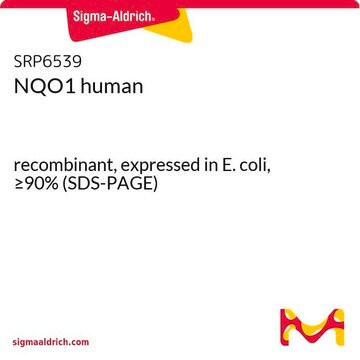F1392
Riboflavin 5′-monophosphate sodium salt hydrate
suitable for electrophoresis, suitable for acrylamide photopolymerization, ≥70%, powder
Synonyme(s) :
FMN-Na, Flavin mononucleotide, Riboflavin 5′-phosphate sodium salt
About This Item
Produits recommandés
Niveau de qualité
Pureté
≥70%
Forme
powder
Activité optique
[α]20/D +37 to +42°, c = 1.5 in 5 M HCl(lit.)
Technique(s)
electrophoresis: suitable
Solubilité
H2O: soluble 50 mg/mL, clear, orange
ε (coefficient d'extinction)
12.5 at 445 nm at 1 mM
Adéquation
suitable for acrylamide photopolymerization
Activité étrangère
Protease, none detected
Température de stockage
−20°C
Chaîne SMILES
O.[Na+].Cc1cc2N=C3C(=O)NC(=O)N=C3N(C[C@H](O)[C@H](O)[C@H](O)COP(O)([O-])=O)c2cc1C
InChI
1S/C17H21N4O9P.Na.H2O/c1-7-3-9-10(4-8(7)2)21(15-13(18-9)16(25)20-17(26)19-15)5-11(22)14(24)12(23)6-30-31(27,28)29;;/h3-4,11-12,14,22-24H,5-6H2,1-2H3,(H,20,25,26)(H2,27,28,29);;1H2/q;+1;/p-1/t11-,12+,14-;;/m0../s1
Clé InChI
BHRVCJBIICJWTH-APQIITSESA-M
Vous recherchez des produits similaires ? Visite Guide de comparaison des produits
Application
- to study its mechanism of inhibition of mutagenicity of a benzo[a]pyrene 7,8-diol 9,10-epoxide, a carcinogenic metabolite of benzo[a]pyrene
- along with flavin adenine dinucleotide for reactivation of the enzyme that catalyzes the oxidation of pyridoxamine to pyridoxal in a study
- to study the reduction of polymeric azo and nitro dyes by intestinal bacteria
- to study the effect of FMN on ferrisiderophore reductase activity in the cytoplasmic fraction of Agrobacterium tumefaciens.
Actions biochimiques/physiologiques
FMN is suitable as a photopolymerization reagent in polyacrylamide gel electrophoresis (PAGE) by forming free radicals in aqueous solution in the presence of light. FMN photodecomposes to leucoflavin. No free radicals are formed in the absence of oxygen, but traces of oxygen allow for leucoflavin to reoxidize with free-radical generation. The catalysts, tetramethylethylenediamine (TEMED) or 3-dimethylaminopropionitrile (DMAPN), are commonly added to speed up the free radical formation. Free radicals will cause acrylamide and bis-acrylamide to polymerize to form a gel matrix which can be used for sieving macromolecules. FMN is commonly used in the stacking gel for non-denaturing PAGE because native proteins can be sensitive to persulfate ions from ammonium persulfate. Another advantage of FMN over ammonium persulfate is that it will not start polymerizing until the gel is illuminated.
Code de la classe de stockage
11 - Combustible Solids
Classe de danger pour l'eau (WGK)
WGK 1
Point d'éclair (°F)
Not applicable
Point d'éclair (°C)
Not applicable
Équipement de protection individuelle
Eyeshields, Gloves, type N95 (US)
Certificats d'analyse (COA)
Recherchez un Certificats d'analyse (COA) en saisissant le numéro de lot du produit. Les numéros de lot figurent sur l'étiquette du produit après les mots "Lot" ou "Batch".
Déjà en possession de ce produit ?
Retrouvez la documentation relative aux produits que vous avez récemment achetés dans la Bibliothèque de documents.
Les clients ont également consulté
Notre équipe de scientifiques dispose d'une expérience dans tous les secteurs de la recherche, notamment en sciences de la vie, science des matériaux, synthèse chimique, chromatographie, analyse et dans de nombreux autres domaines..
Contacter notre Service technique




